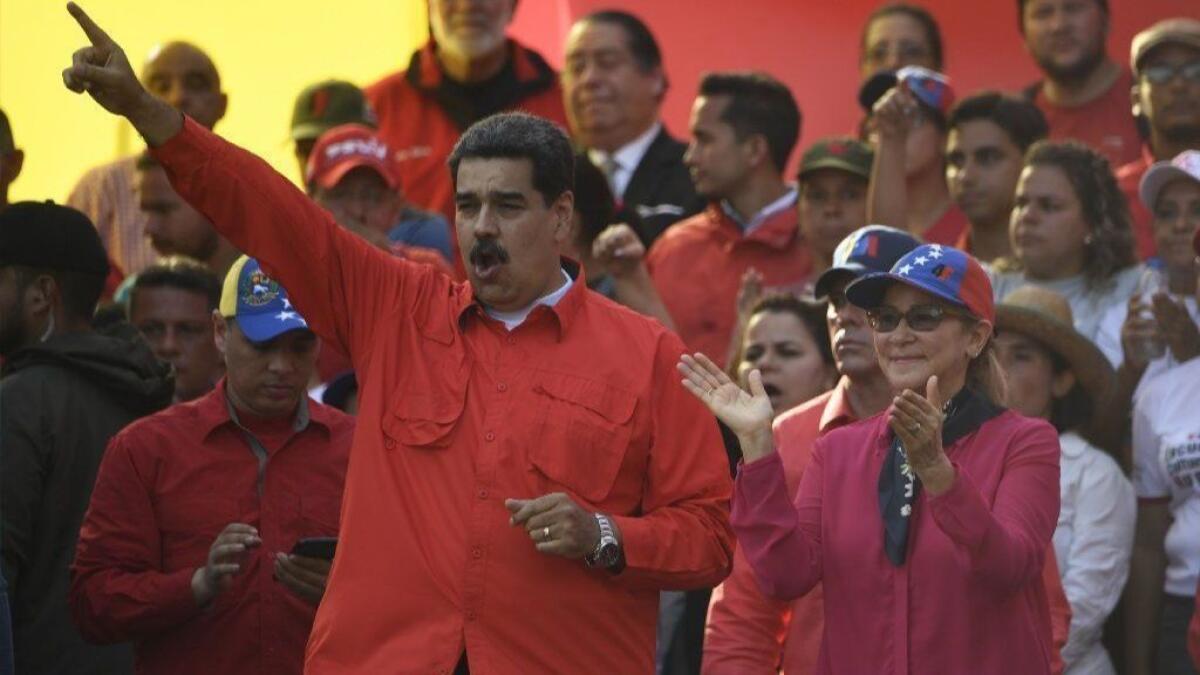Readers React: Is U.S. imperialism at play in Venezuela? Readers say yes

- Share via
Nicolas Maduro, the disputed president of Venezuela who has ruled by decree for the last six years, held on to power in 2018 by winning an election widely regarded as fraudulent. His country is gripped by starvation and runaway inflation despite possessing the world’s largest proven oil reserves.
And, if you ask some of our letter writers, the biggest villain in Venezuela’s crisis is the United States.
The U.S. has a sordid history in Latin America of usurping democracy, and some readers see Uncle Sam’s imperialistic hand at work once again in the attempted coup this week by opposition leader Juan Guaido. But the opinions on Venezuela also fit a larger pattern: Our letter writers often express sympathy for regimes that openly oppose the United States, even North Korea.
Tracy Nadeau of Los Angeles doesn’t see the U.S. as a force for good:
The hypocrisy of the United States is beyond contemptible.
For more than two years, all we heard about from our mainstream media and many on the left was “Russian Interference” in our election, and yet at this very moment our government is engaged in regime change in Venezuela.
The rest of the world sees us for what we’ve become: a gangster that feels entitled to commit atrocities throughout the world. We are no longer the good guys.
Kathleen O’Connor Wang of Long Beach says Maduro is the legitimate president of Venezuela:
If U.S. military personnel were complicit with House Speaker Nancy Pelosi in trying to overthrow President Trump, they would all be arrested.
Guaido is a collaborator with the U.S. trying to remove the elected president of Venezuela from power. His actions violate that country’s constitution.
Why don’t we read more about the U.S. sanctions’ effect on Venezuela’s ability to take care of its needs? This seems like another shameful attempt to purloin another country’s resources.
William Gilbert of Costa Mesa recalls a moment from his days in the Navy:
In fall 1960, I was serving on the USS Topeka, a guided missile cruiser. On the way to our new home port in Long Beach, we anchored for a few days near the coast of El Salvador.
Curiously, the ship was oriented broadside to the incoming swells, so it rolled constantly. During some more extreme movements, many of us wondered if the ship was about to roll over. I have been at sea many times since then and wondered why we anchored that way.
At the time people of El Salvador were struggling to change their government, but the United States claimed the Soviet Union was involved. Sound familiar?
Viewed from the side, the Topeka was an impressive sight, with its newly installed missiles and original large guns. I believe it was a warning to those on shore in El Salvador not to go against the wishes of the United States.
Now, Washington warns of greater sanctions on Venezuela and even military action. Why not let the Venezuelans sort this out themselves?
Follow the Opinion section on Twitter @latimesopinion and Facebook
More to Read
A cure for the common opinion
Get thought-provoking perspectives with our weekly newsletter.
You may occasionally receive promotional content from the Los Angeles Times.







